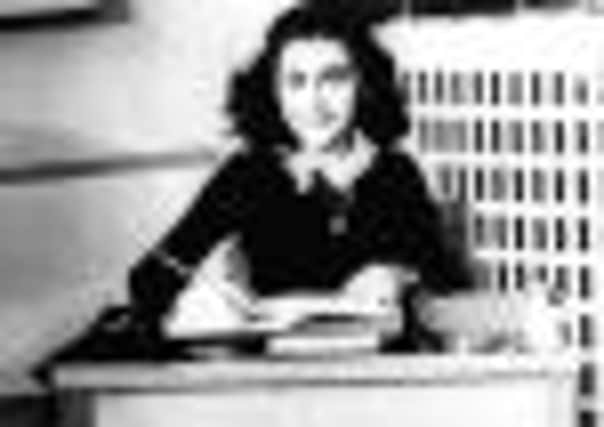How Anne Frank’s Diary inspired a choral adaptation
This article contains affiliate links. We may earn a small commission on items purchased through this article, but that does not affect our editorial judgement.


In the film Mermaids, Winona Ryder’s character says she wishes she’d met Anne. In her eponymous television show, Sarah Silverman recites part of the diary during the Little Miss Rainbow pageant, and in Geoff Ryman’s novel 253, Anne appears as an elderly passenger on London’s underground. Her influence has affected musicians as well.
In 1980, Human Sexual Response included a song called Anne Frank Story on their album Fig. 14. Neutral Milk Hotel’s 1998 album, In the Aeroplane Over the Sea, is completely inspired by their lead singer’s affection for the diarist, while a punk band from Colorado went as far as naming themselves Anne Frank on Crank. Even Outkast refer to her in their song So Fresh, So Clean.
Advertisement
Hide AdBritish composer James Whitbourn wrote a concert-length choral work entitled Annelies (Anne’s real name), which had its première in London in 2005. Its libretto comes from award-winning poet Melanie Challenger, whose most recent book, On Extinction, examines how and why we’ve become estranged from nature.
Challenger was fresh out of university, in 2001-3, and had already worked on musical projects with children in Bosnia. She approached Whitbourn with the idea of using the diary as the basis of a musical work, creating the libretto from multiple versions of the diary, she tells me, “to try and keep it as true to her as possible”. She and Whitbourn were the first people ever permitted to use the actual diary text as the basis for a major choral work. Whitbourn originally scored it for an orchestra, but has just released a CD of a chamber version, recorded in Princeton, New Jersey, last year.
The libretto deliberately focuses on Anne’s spiritual and psychological observations, rather than the quotidian realities of life in hiding. “I was very young when I got involved in the project,” says Challenger, “and I don’t think I’d ever touch the story of Anne Frank and the Holocaust in a creative way now that I’m older, but in some ways that’s what’s special for me about this piece. I wanted to use the arts in some kind of socially active way, and I was shocked by how many young people I worked with in education didn’t even know what the Holocaust was. It seems unbelievable to most educated adults, but it’s true that a generation can forget these things. I was deeply moved by her diary as a child, and felt that it remained the most powerful document from the Second World War, in terms of encouraging humane values in young people.”
And, she emphasises, the music is deliberately written to be comprehensible to young people. “I think that is very hard to do, but it does mean the diary can come to generations of young people in a different and very accessible medium, rather than through classroom lessons.”
What most moved her was Frank’s ability to identify two distinct aspects of her personality. “The lively, social animal, and what she termed her ‘purer’ side, which amounted to her altruistic and moral sentiments. The more we understand about human behaviour now, the more significant this division becomes. In terms of wanting to know how ordinary people can perform the kinds of acts of cruelty that took place in those war years, such a perspective is profoundly important. Nonetheless, what’s most vital about her diary is that it gives the spiritual flesh back to people whose lives were so utterly destroyed.
“The Holocaust was not only the most industrial act of human violence ever perpetrated, but one in which so many ordinary people took part in acts of extreme cruelty and selfishness. Any understanding of us as a species, and of our history as global societies, is incomplete without continued recognition of this moment of the human past. Anne’s diary is a shining, vital artefact from amid those horrors and it remains there like a flame in the potential dark of our memory, to show us the unforgivable failures of morality and tolerance of which we can be capable.”
Advertisement
Hide AdIt’s sobering to think that had she survived, Anne would be in her eighties now, just a bit younger than Queen Elizabeth II, whose picture – as a young princess – Anne kept tacked up on the wall of her attic hideaway.
Fittingly enough, the Queen was on hand to hear three sections of the work performed at the UK’s National Holocaust Day event for the 60th anniversary of the liberation of Auschwitz, a few days before the official orchestral première, in 2005, with conductor Leonard Slatkin. The setting for that first concert was Westminster Hall, within the houses of parliament, and Whitbourn, in his liner notes, points out the happy coincidence that it has now been recorded at the Princeton campus of Westminster Choir College of Rider University, where Annelies had its North American première in 2007.
Advertisement
Hide AdSpare and selective, the libretto deftly transforms the diary into poetry, and it feels appropriate to leave the last word with Anne, via Challenger: “I see the world being slowly/turned into wilderness./I hear the approaching thunder,/that one day will destroy us too./And yet, when I look at the sky,/I feel that everything/will change for the better.”
Annelies features the singers of the Westminster Choir College, Princeton, New Jersey. James Jordan conducts, with soprano soloist Arianna Zuckerman, the Lincoln Trio, and clarinettist Bharat Chandra. Annelies is available from Naxos for purchase or download. You can listen to a sample track here, or find out more via www.naxos.com. It is also available on Amazon. International Holocaust Memorial Day is 27 January.